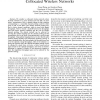Free Online Productivity Tools
i2Speak
i2Symbol
i2OCR
iTex2Img
iWeb2Print
iWeb2Shot
i2Type
iPdf2Split
iPdf2Merge
i2Bopomofo
i2Arabic
i2Style
i2Image
i2PDF
iLatex2Rtf
Sci2ools
98
Voted
INFOCOM
2007
IEEE
2007
IEEE
Joint Optimal Channel Probing and Transmission in Collocated Wireless Networks
— We consider a collocated wireless network where all links contend for a given channel and each link can hear others’ transmissions. Due to channel fading, the link condition corresponding to a successful channel probing could be either good or bad. In the latter case, further channel probing may lead to better channel conditions, which in turn yields higher throughput. There is clearly a tradeoff between the throughput gain from better channel conditions and the cost for further channel probing. The desired tradeoff can be achieved by choosing the optimal stopping time for channel probing and the transmission rate, in the sense of maximizing the overall average throughput. Using optimal stopping theory, we show that the joint optimal channel probing and transmission (JOCPT) strategy is a pure threshold policy, and interestingly, the threshold turns out to be the optimal average throughput, which is the solution to a fixed point equation. Since the optimal throughput usually cann...
Related Content
| Added | 03 Jun 2010 |
| Updated | 03 Jun 2010 |
| Type | Conference |
| Year | 2007 |
| Where | INFOCOM |
| Authors | Dong Zheng, Junshan Zhang |
Comments (0)

